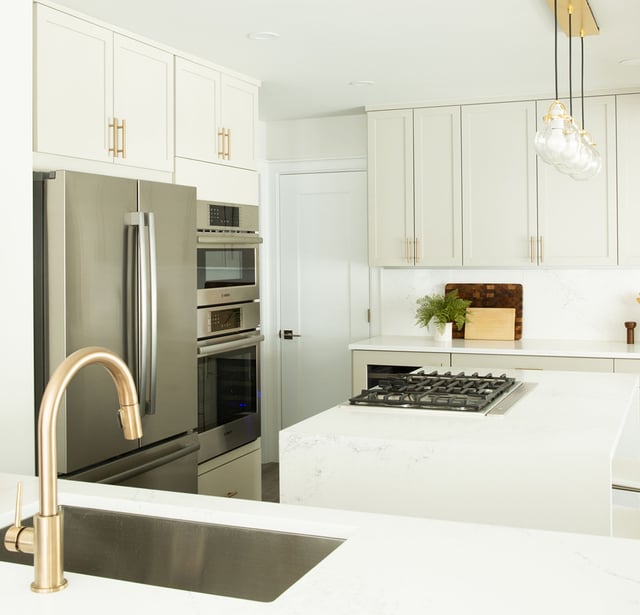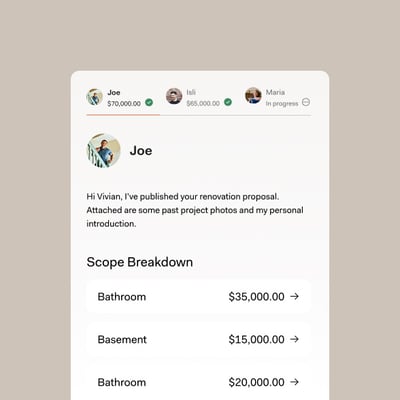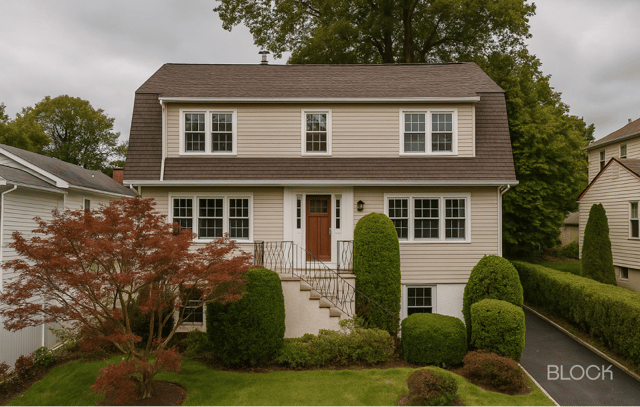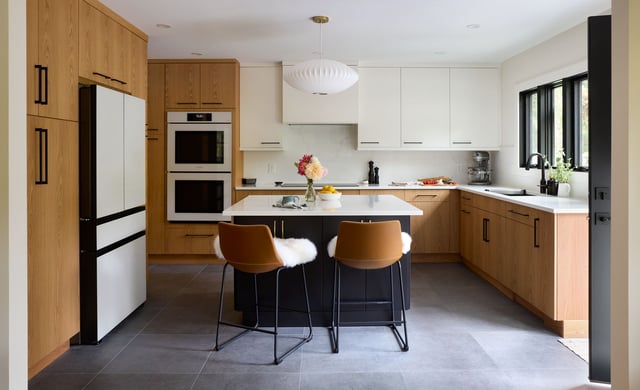
Westchester County
Custom Home Remodeling in Scarsdale, New York—Costs and Contractors
11.11.2025
Our New Year savings event is here: Get up to $6,500 off your project today (terms apply).


In This Article
Thinking about renovating your home in Westchester? Get excited because transforming that 'fixer-upper' into your dream home will be an investment worth every penny! From designing your dream kitchen to choosing the perfect bathroom tile and maybe even a few unexpected but exciting upgrades (because, let's be honest, they always add a little flair), home renovation in Westchester is like planning a small wedding—except instead of cake, you get gorgeous countertops and a home that truly reflects your style. We're here to break down exactly what you're in for and help you budget like a pro—without losing your sense of humor (or your sanity). So, let's dive into the ultimate guide to home renovation costs in Westchester.
When it comes to renovating in Westchester, it's not exactly a one-size-fits-all situation. The cost really depends on just how far down the rabbit hole you're willing to go. A basic renovation—think fresh paint, new flooring, and a little cosmetic touch-up—will run you around $100 to $300 per square foot. But if you're dreaming of tearing down walls, redoing the kitchen, or going all out with fancy finishes, buckle up! You're looking at $400 to $800 per square foot or more.
Kitchens can easily set you back between $35,000 and $65,000, and those bathroom upgrades? Expect a price tag anywhere from $34,000 to $60,000. And, of course, there's always the 'fun' surprise of hidden plumbing disasters or electrical upgrades that will nudge your budget higher. The good news? Getting multiple quotes can help you find the right contractor for your project—and maybe keep a little extra in your pocket for that fancy new backsplash you've been eyeing.
Learn More: How to Start Planning a Home Renovation
The final cost of renovating your home in Westchester can vary depending on several key factors. Here's what to keep in mind:

Labor is often the biggest chunk of your renovation budget—around 60% of the total. The cost really depends on how complicated your project is. You'll likely need a mix of pros, like a general contractor, electrician, plumber, and maybe even some specialists. The more intricate the work, the higher the labor costs. So, if you're dreaming of knocking down walls or adding that fancy soaking tub, prepare for the labor fees to rise right along with your ambitions.
Considering bringing in a designer? It's an extra cost, but it can be a lifesaver when it comes to pulling your renovation vision together. Designers help with material choices and layouts and avoid expensive mistakes. The good news is that design services can be flexible—so whether you want full-on guidance or just a little help picking the perfect paint color, there's an option for you.
Materials will take up around 30% of your budget, but this number can swing based on your choices. We're talking everything from flooring to cabinets and tiles to appliances—each decision adds up quickly. Material prices vary wildly, so it's important to research and balance cost with quality. Pro tip: Stay flexible! Stock issues or unexpected price hikes are common, so have backup options in mind for those dream finishes.
Don't forget about the little things! Items like demolition, debris removal, hardware, and light fixtures can sneak up on you and inflate your budget. Make sure you examine these extra expenses so you don't end up dipping into your savings to cover last-minute surprises.
No matter how carefully you plan, something unexpected always lurks behind those walls. Maybe it's mold, or perhaps your wiring needs a total overhaul. Set aside about 10% of your budget for these curveballs to keep things from getting too stressful. You'll thank yourself when they inevitably pop up.
Renovate with confidence every step of the way
Step 1: Personalize Your Renovation Plan
Step 2: Receive Quotes from Trusted Contractors
Step 3: Let Us Handle the Project Details

Pondering a gut renovation in Westchester? Get ready for a major overhaul—walls, floors, ceilings, and possibly the plumbing and electrical systems will all be on the chopping block. This type of renovation gives you a blank slate to work with, but it’s not for the faint of heart (or thin of wallet). On average, gut renovations can set you back $400 to $800 per square foot or even more, depending on how extensive the changes are and the quality of the finishes. So, for a 1,000-square-foot home, expect to spend between $400,000 and $800,000. For a 2,500-square-foot space, that could balloon to $1 million to $2 million.
If that sounds a bit too intense, a non-gut renovation might be more up your alley. This approach focuses on updating your space without major structural changes—think fresh paint, new flooring, or a cosmetic touch-up. Basic renovations typically start around $100 to $300 per square foot. It's a more budget-friendly way to refresh your home without breaking the bank.
Whether you’re diving deep with a gut renovation or keeping it simple with surface updates, keep in mind that the final cost will depend on the specifics of your project. And, as always, set aside a little extra for those inevitable surprises that pop up along the way.
.jpg?width=1080&height=720&name=Block%20Renovation%20-%20Gerrit%20-%20May%2026%2c%2020231442%20(1).jpg)
When organizing a renovation in Westchester, don't forget to budget for permits! The cost can vary depending on where you live in the county and the scope of your project. For minor updates—like a quick cosmetic change—you'll need a basic permit. In towns like Katonah, this will run you $14 for every $1,000 of your project's budget. So, for a $5,000 renovation, you're looking at around $70.
However, if your project is a bit more involved—such as adding a new room, making structural changes, or increasing the occupancy—you'll need a more comprehensive permit. For instance, in Pelham, building permits start at $250 for projects under $5,000, plus $12 for every additional $1,000. In Scarsdale, if your project is between $10,000 and $50,000, the permit will cost $255. For larger projects over $100,000, expect a flat fee of $1,755 plus $14 for each additional $1,000.
And don't forget Hastings-on-Hudson, where the fee is $17 per $1,000 of your estimated construction cost. While dealing with permits might seem like a hassle, they're crucial for ensuring your renovation stays on track and meets all local regulations.
When assessing your renovation in Westchester, one major factor that can impact your budget is whether you're tackling a "dry" space or a "wet" space. This distinction is more than just a technicality—it can significantly affect your overall costs. Here's how it breaks down:
Renovating wet spaces like bathrooms, kitchens, or laundry rooms tends to be pricier. These areas are exposed to water and humidity, so you'll need specialized labor and materials. Expect costs to go up due to the need for plumbing, tiling, waterproofing, and durable, water-resistant materials. It's wise to hire professionals with experience in these areas because errors can lead to expensive repairs later on.
.jpg?width=3239&height=2160&name=LaurenJohnson_19%20(1).jpg)
Dry spaces like bedrooms, living rooms, and dining rooms are generally kinder to your wallet. Since you're not dealing with plumbing or waterproofing, the work here is typically more straightforward—think painting, new flooring, or electrical updates. This makes dry space renovations more affordable than the more complex wet areas.
When renovating, considering your heating and cooling options is crucial. The costs can vary widely based on the system you choose and the specifics of your home. Here's a breakdown of what to expect:
Installing a new heating and cooling system can be a significant expense. A basic system might cost around $2,000, but more complex systems could cost tens of thousands of dollars. The final price will depend on the type of system you choose and the size of your home.
These systems are common in larger Westchester homes and buildings. They tend to be pricier due to the need for ductwork and high-capacity units, but they offer consistent temperature control throughout your entire home.
If you prefer something more flexible and energy-efficient, split systems or mini-splits might be your best bet. These are great for individual rooms and are easier to install, especially in older homes without existing ductwork. They can also be more budget-friendly upfront and save you money on energy bills over time.
Radiant heating is the luxury option, featuring heating elements installed under floors or within walls. It's more expensive to install but offers the comfort of warm floors on those chilly Westchester mornings. It could be worth the extra investment if you're willing to splurge.
Don't just focus on the initial installation costs—consider the ongoing operating expenses as well. While energy-efficient systems might cost more to install, they can result in significant savings on utility bills in the long run, making them a smart investment for the future.
Compare Proposals with Ease

Creating a solid budget is crucial for a smooth renovation experience and avoiding those dreaded surprise expenses. A well-thought-out budget helps you prioritize what’s important and spot where you can cut costs. Here’s how to get started:
Before starting your renovation, review your finances and set a realistic spending limit. It’s easy to get carried away with visions of grandeur, but knowing your financial boundaries from the start will keep your project on track.
Figure out what’s most important for your renovation. Which areas of your home need the most attention? By setting clear goals, you can focus your budget on the most important aspects and avoid splurging on less critical details.
To stay organized, divide your budget into categories like labor, materials, design services, permits, and a contingency fund. A good rule of thumb is to allocate about 60% of your budget to labor, 30% to materials, and 10% to unexpected costs.
Start with the essentials. Safety and functionality upgrades—such as electrical work, plumbing, or structural repairs—should be your top priority before you dive into cosmetic updates.
Even with the best planning, surprises can pop up. Set aside 10-20% of your budget for those unexpected expenses. This way, you’ll be prepared for any curveballs without derailing your financial plans.

Picking the right contractor is by far the most crucial decision for your renovation project. Your contractor will be your guide, partner, and problem-solver throughout the entire process.
Navigating the world of contractors can be daunting, but at Block we simplify it by connecting you with up to three top-rated pros from their exclusive network. Our thorough vetting process ensures each contractor:
You’ll have the chance to meet these contractors during a site visit, easily compare their proposals, and find the perfect fit for your renovation needs. Get started with Block to receive a free quote today!

Written by Block Renovation
What is the average cost per square foot for a home renovation in Westchester?
How long does a typical home renovation take in Westchester?
Do I need a permit for my home renovation in Westchester?
Can I live in my home during the renovation?
What are some hidden costs I should be aware of?
How much does it cost to renovate a bathroom in Westchester?
What is the process for getting a renovation permit in Westchester?
What is the cost of hiring an architect or designer for a renovation project in Westchester?
How can I ensure my renovation project stays on budget and on schedule?

Renovate confidently with Block
Easily compare quotes from top quality contractors, and get peace of mind with warranty & price protections.
Thousands of homeowners have renovated with Block

4.5 Stars (100+)

4.7 Stars (100+)

4.5 Stars (75+)

Westchester County
Custom Home Remodeling in Scarsdale, New York—Costs and Contractors
11.11.2025

Westchester County
New Rochelle Remodeling: Contractors, Costs & Trends
11.11.2025

Westchester County
Home Remodeling in Yonkers - Contractors, Cost & Tips
10.31.2025

Kitchen
A Pound Ridge Kitchen Remodeled: From Dated to Modern
10.14.2025

Cost
How Much Does a Bathroom Addition Cost?
09.26.2025
Renovate confidently